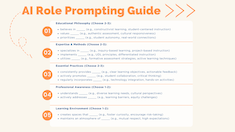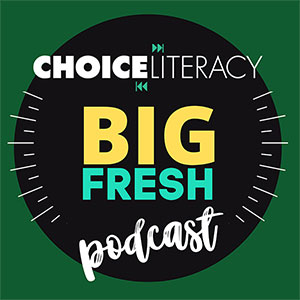Brian Sepe
Brian Sepe is an instructional literacy coach in Buffalo, New York. He is also a consultant and instructional coach with the Western New York Teaching Residency Program. Brian’s experience is steeped in the Teachers College Reading and Writing Program and in K-8 classrooms. He is also trained through the Instructional Coaching Group (ICG) with Jim Knight. You can find Brian at briansepe.com and @Brian_Sepe_ through social media.
All Content
Beyond “I’m a Third-Grade Teacher”: The Power of Role-Specific Prompting in Educational AI
Brian Sepe helps us understand the importance of prompting and offers a framework that will help us be more intentional and specific to leverage AI for our needs.
Goals Create Direction
Brian Sepe offers sage advice about goal-setting to relieve stress. He offers a simple framework that will keep your coaching conversations focused on student growth and forward momentum.
Multiplier Mindset
Brian Sepe guides us in a reflective practice activity to help strengthen our mindsets as leaders who multiply and grow the intelligence of those around them. This article was inspired by Liz Wiseman’s book Multipliers.
Balancing Ambition with Humility
Brian Sepe defines a leader as someone who balances ambition and humility. Although ambition and humility may seem like opposing forces, the most effective leaders are those who skillfully blend these two traits.
Developing an Ambitious Vision with Humility
Brian Sepe guides leaders in determining how to strike a balance between ambition and humility to achieve objectives and to influence and inspire the people they lead.
How Do You Show Up?
Brian Sepe encourages instructional coaches to engage in self-reflection to better meet the needs of teachers. Using a simple matrix, Brian leads us to powerful realizations for showing up in meaningful ways.
Research and Learn
Brian Sepe offers a protocol and downloadable tool for teachers and coaches to research student writers. It is good for the soul to bear witness to the good that students bring to the classroom.
January 28, 2022: Word Work
This week’s newsletter is about word work.
Goals Are Greater than Nice Conversations
Brian Sepe moves instructional leaders to commit to encouraging growth through focused goal-setting rather than having “nice conversations.”
A Checklist of Ideas to Support New Teachers
Brian Sepe offers a quick but powerful checklist for instructional coaches to consider ways to form a solid foundation for working with new teachers.
Coaching Minute: Reminders for Facilitating Coaching Conversation
Instructional coach Brian Sepe offers three reminders for facilitating a coaching conversation.
Connections Podcast Brian Sepe
Brian Sepe discusses the importance of connections and mantras.
Mantras Matter
Brian Sepe guides us in the importance of creating and living by mantras.
Trending Hashtags: Finding Priorities in a Unit of Study
Brian Sepe is inspired by trending hashtags and offers a step-by-step guide to lead colleagues in finding priorities in a unit of study.
Writing Work Plans
Brian Sepe empowers students to make their own plans during writing workshop.
Small-Group Instruction: Bookmaking
Brian Sepe shares one of his favorite activities for small groups of young learners: making books together.
Reading Invasion
"Imagine roughly 400 people—staff and students—walking out into the green space on your school campus. Now imagine every one of them with a book in hand. Next, they all take up a space that feels comfortable. Then, they read." Brian Sepe explains how a "reading invasion" is a simple, fun, and powerful way to promote a reading community.
A Checklist for Reflection
Brian Sepe develops a simple reflection checklist to plan next steps, calm his mind, and transition from school to home.
From Somewhere to Somewhere
Brian Sepe struggles in a coaching cycle with an experienced teacher and realizes he has imposed his agenda on the work. His reflection leads to some changes in the ways he collaborates with colleagues.
Reigniting Your Coaching Schedule in December
Brian Sepe ponders the best uses of his coaching time when he is between cycles. He shares three options for building relationships with teachers.
Becoming a Literacy Coach: Principles and Mission Statements
Brian Sepe thinks about what has influenced his coaching, and through that process develops a mission statement and a vision statement to guide his work.
Improving My Feedback
Brian Sepe explores the difference between appreciative and coaching feedback, and why both are essential for literacy coaches to give to teachers.
Coaching Tool: Voice-Overs
Brian Sepe uses "voice-overs" (reflecting aloud during demonstration lessons) to help display his thinking to teachers who are observing the instruction.
CoffeeEDU
Are the teachers you work with too overbooked for more professional development time? Literacy coach Brian Sepe finds that voluntary 15-minute sessions before school are wildly successful. He shares tips for implementing these lightning-fast workshops.
Twitter Book Chats
Brian Sepe gives the nuts and bolts for hosting book chats for teachers on Twitter.
Coaching New Teachers
Brian Sepe explains how literacy coaches can best support new teachers.
Infusing Technology into Writing Celebrations (Grades K–2)
Brian Sepe works in a school with iPads aplenty in grades 3 and up, but few available for first graders. He works with a first-grade teacher to find ways to showcase young students’ writing using an inexpensive tech app.
Video and the Thoughtful Coach
Brian Sepe finds video is a wonderful tool for fostering both teacher and coach reflection.
Overwhelmed Coach
When literacy coach Brian Sepe realizes he’s wearing thin, he adopts some practical strategies to deal with feeling overwhelmed.







